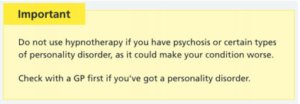Does Hypnotherapy Really Work?
Yes. It really does. As long as you want it to work.
What I mean by that is, a hypnotherapist can only hypnotise a person who wants to make some changes. For example, if your partner sends you to see a hypnotherapist because he or she wants you to stop smoking (and you don’t want to stop smoking), it’s not likely to be effective.
You just can’t hypnotise people to do things they really don’t want to do.
However, if you want to make some changes, even if you don’t believe in the ‘Power of Hypnosis’, the chances are high that you will be successful.
 What will I learn in this blog?
What will I learn in this blog?
• That everyone can be hypnotised if they wish to be
• The more open you are to treatment, the better the results
• If you are passionate about change, hypnosis can help
• How hypnosis could help you get back in control
What happens in hypnotherapy?
There are different types of hypnotherapy, and different ways of hypnotising someone. So, how does hypnotherapy really work?
First, you’ll usually have a talk with your therapist to discuss what you hope to achieve and agree what methods your therapist will use. At The Hypnosis Clinic, we offer a free initial consultation either in person or via video, so you can find out more about how suitable it is for you.
After this, the hypnotherapist may:
• Lead you into a deeply relaxed state – most people feel refreshed and relaxed
• Use your agreed methods to help you towards your goals
• Gradually bring you out of the trance-like state. Most people feel refreshed and relaxed
 You’re fully in control when under hypnosis and do not have to take on the therapist’s suggestions if you do not want to.
You’re fully in control when under hypnosis and do not have to take on the therapist’s suggestions if you do not want to.
If necessary, you can bring yourself out of the hypnotic state.
Hypnosis does not work if you do not want to be hypnotised.
What is the success rate of hypnotherapy?
Early studies from the 90s found that people who used hypnosis lost more than twice as much weight as those who dieted without the cognitive therapy.
A 2014 study worked with 60 obese women, and found that those who practiced hypo-behavioural therapy lost weight and improved their eating habits and body image. And a small 2017 study worked with eight obese adults and three children, all of whom successfully lost weight, with one even avoiding surgery due to the treatment benefits.
Of course, none of this is conclusive, so you should follow these simple guidelines to explore hypnotherapy as an option.
 • Choose a hypnotherapist that offers a free introduction, so you can see if you are comfortable.
• Choose a hypnotherapist that offers a free introduction, so you can see if you are comfortable.
• Check out their Google Reviews.
• Find out what their qualifications and and how long they have been in practice.
• Choose a hypnotherapist who has passed exams from a reputable body, like The British or American Council of Hypnotist Examiners.
 • Find one who is represented by a trade association like the National Hypnotherapy Society.
• Find one who is represented by a trade association like the National Hypnotherapy Society.
• Finally, only work with someone you feel comfortable with.
What did I learn here?
We asked ‘Does hypnotherapy really work?’ And the answer was that hypnotherapy can be very successful if you find a good practitioner and you have a strong desire for change.
If you’d like to find out more about how hypnosis can help you, have a look at our website, https://thehypnosisclinic.com. We offer a free initial consultation, either by a Telehealth video link or at our clinic right in the heart of London’s Regent Street.

